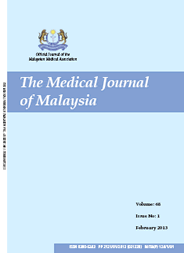MJM, Vol 70 Supplement 1 September 2015
Nutritional status, knowledge, attitude and practice
among orphans living in institutions in Selangor and Melaka
Faculty of Medicine and Health Sciences, Universiti Sains Islam Malaysia
ABSTRACT
Introduction: Nutritional problems are significantly more common in young children and are strongly associated with social deprivation. This study aims to determine nutritional status, knowledge, attitude and practice of nutrition among children and adolescents’ living in orphanage institutions in Selangor and Melaka.
Method: A cross-sectional study was conducted using face-to-face interview among 128 randomly selected children and adolescents in five orphanage institutions using standardised and self-validated questionnaires. Their height and weight were measured. The result were analysed using IBM Statistics version 20.
Results: Majority of them (62.0%) have normal body mass index (BMI), 18.8% were overweight, 13.3% were obese and 6.2% were underweight. Half of the children (12 years old and below) and half of the adolescents (13 until 18 years old) (53.6% and 52.3% respectively) have high nutritional knowledge. Majority of them has good attitude (85.9%) and good practice of nutrition (76.6%). The mean knowledge showed statistical significant with association with increase in age of the respondents (p-value 0.020) whereas others showed no statistical significance.
Discussion: The percentage of overweight and obese in this study is higher compared to other study among school children in Malaysia (Kashmini et al., 1997 and Zaini et al., 2005). An Australian study on nutritional knowledge also found that older respondents had significantly higher knowledge level (Hendrie et al., 2008). A study in Ireland also reported that those with positive attitude were more obedient to dietary guideline (Hearty et al., 2007). Half of our respondents (50.8%) eat vegetables and fruits at least three time a day which is better than a study in the United States (Baxter & Thompson, 2002) that reported half (49%) of their respondents did not take vegetables at all.
Keywords: orphanage, obesity, undernourished, nutritional problems
